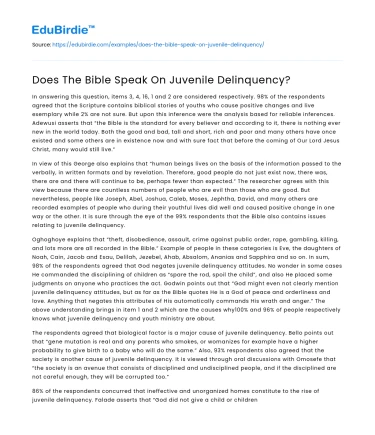Introduction
The Bible, as a foundational text for many, offers insights into various aspects of human life, including moral and ethical behavior. Given its comprehensive nature, one might ponder whether the Bible addresses modern-day issues such as juvenile delinquency. Juvenile delinquency, defined as the participation in illegal behavior by minors, is a growing concern globally, prompting communities and scholars alike to seek guidance from historical and religious texts. While the Bible does not explicitly mention juvenile delinquency as understood in contemporary terms, it provides principles and teachings that can be applied to issues of youth misconduct. This essay explores how Biblical teachings might relate to juvenile delinquency, analyzing relevant scriptures and considering their implications for today's society. By examining these texts, we can discern whether Biblical principles offer a framework for addressing the moral and ethical challenges associated with juvenile behavior.
Biblical Teachings on Youth Behavior
The Bible addresses issues of youth behavior and responsibility indirectly through various teachings and stories. The Book of Proverbs, for instance, is rich with instructions aimed at young people. Proverbs 22:6 advises, "Train up a child in the way he should go, and when he is old he will not depart from it." This passage underscores the importance of early moral and ethical training, suggesting that instilling such values can significantly impact future behavior. The emphasis on familial and community responsibility is evident in these teachings. The story of the prodigal son in Luke 15:11-32 further illustrates themes of youthful rebellion and redemption. It narrates a young man's departure from his father's home, his subsequent downfall, and eventual return, highlighting forgiveness and the possibility of moral rehabilitation. These narratives collectively suggest that improper conduct by youth is not a new phenomenon and that the Bible encourages guidance, discipline, and the possibility of redemption.
Save your time!
We can take care of your essay
- Proper editing and formatting
- Free revision, title page, and bibliography
- Flexible prices and money-back guarantee
Furthermore, the Bible emphasizes respect for authority and adherence to societal norms, which are crucial elements in preventing juvenile delinquency. Romans 13:1-2 states, "Let every person be subject to the governing authorities." Such teachings advocate for respect towards laws and authorities, reinforcing societal structures that deter delinquency. The Bible’s focus on community and collective responsibility strengthens the notion that delinquency is a societal concern, not just an individual issue. Therefore, while the Bible does not address juvenile delinquency directly, its teachings on youth behavior provide a moral compass and stress the importance of upbringing, respect for authority, and community involvement in shaping young minds.
The Role of Family and Community
The family unit holds a pivotal position in Biblical teachings, often depicted as the primary environment for nurturing and ethical upbringing. Ephesians 6:4, for instance, instructs, "Fathers, do not provoke your children to anger, but bring them up in the discipline and instruction of the Lord." This suggests that parents have a fundamental role in guiding their children’s moral development, which can prevent tendencies toward delinquency. The Bible emphasizes a balanced approach to discipline that avoids harshness, which may lead to rebellion or resentment. The biblical model of parenting emphasizes love, discipline, and instruction, aligning with modern research that supports positive parenting as a preventive measure against juvenile misconduct.
Similarly, the broader community is depicted as an integral part of youth development. The concept of the community as a supportive network is evident in Biblical narratives where communal ties and collective responsibility are stressed. The Biblical principle of communal support can be seen in Galatians 6:2, which encourages individuals to "bear one another's burdens." This principle suggests that societal involvement and support systems are crucial in preventing and addressing juvenile delinquency. By fostering a community that reflects Biblical values of mutual care and support, society can create an environment that discourages delinquent behavior and promotes positive youth development.
Counter-Arguments and Modern Context
Critics might argue that the Bible's historical context limits its applicability to modern issues like juvenile delinquency. The socio-cultural setting of Biblical times vastly differs from today's world, where legal systems and definitions of delinquency have evolved. However, the Bible's enduring ethical principles provide a timeless framework that transcends cultural shifts. For instance, the emphasis on moral education, respect for authority, and community responsibility remains relevant. These principles align with contemporary approaches to juvenile justice, which advocate for rehabilitation over punishment and emphasize the role of supportive environments in fostering positive behavior.
Moreover, some may contend that reliance on religious texts for addressing juvenile delinquency may not resonate in increasingly secular societies. Nonetheless, the ethical teachings of the Bible can complement secular approaches by providing a moral foundation that supports societal norms and values. By integrating Biblical principles with modern strategies, communities can develop holistic approaches that address both the moral and social dimensions of juvenile delinquency. Thus, while the Bible may not offer direct solutions, its teachings continue to influence ethical considerations in addressing youth misconduct.
Conclusion
In conclusion, while the Bible does not explicitly address juvenile delinquency as defined today, its teachings offer valuable insights into youth behavior and moral development. By emphasizing early moral education, respect for authority, and communal responsibility, the Bible provides a framework that can inform contemporary approaches to preventing and addressing juvenile misconduct. The narratives and principles found within its pages underscore the importance of family and community in shaping ethical behavior, highlighting the enduring relevance of Biblical teachings. As society continues to grapple with issues of juvenile delinquency, these ancient teachings can serve as a moral compass, guiding efforts to foster environments that promote positive youth development and prevent delinquency. Through the integration of Biblical principles with modern strategies, we can create a more comprehensive and effective approach to addressing the challenges faced by today's youth.






 Stuck on your essay?
Stuck on your essay?

